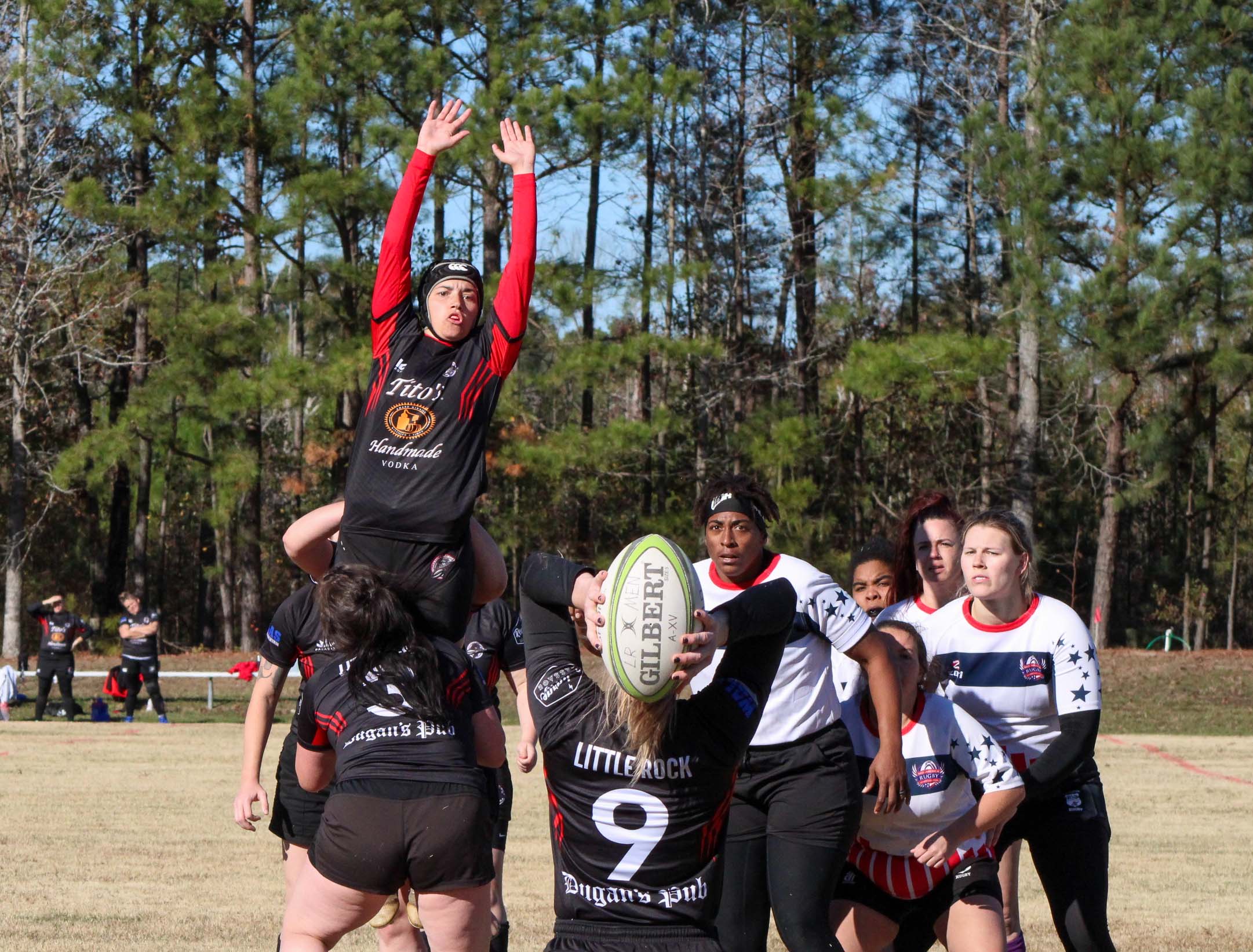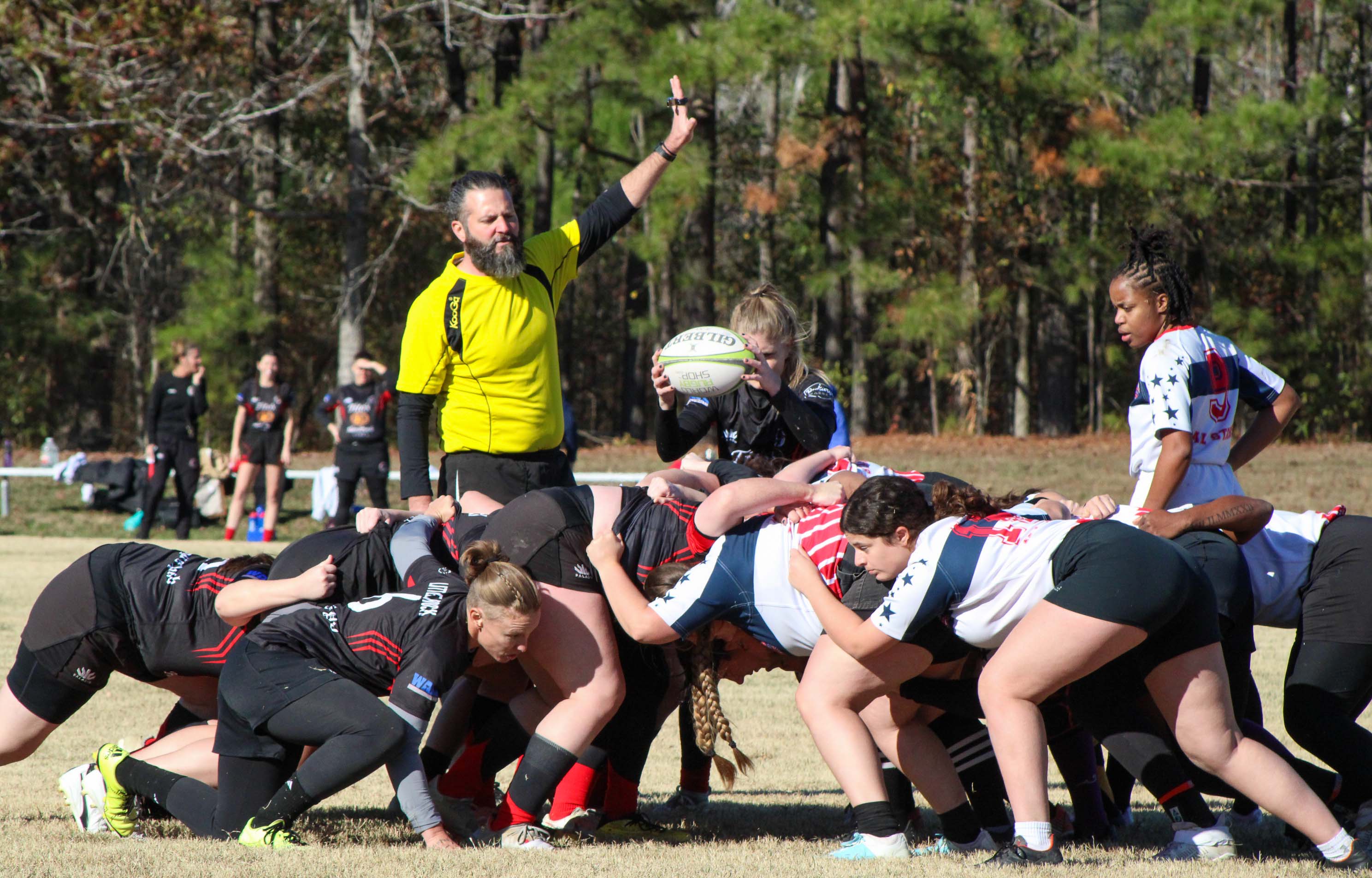Little Rock Rugby alive and well: Ozark Tournament Celebrates 50 years
November 6-12, 2023
By Becca Bona
A few miles south of Little Rock off I-30 sits a peaceful 34 acres of land. Until Saturdays, that is, when the Little Rock Men and Women Stormers take the pitch by storm.
Saturday, as they say - is a rugby day. A sport that many might not be familiar with - rugby continues to grow in popularity throughout the U.S. The game is thrilling and physically demanding, and traces its origins to 19th century England.
Lucy Owen, captain of the Little Rock Women’s Stormers has played rugby for quite some time. Originally from New Zealand, Owen came to Little Rock for college (on a golf scholarship, no less). Since then she’s thrown her heart into the Little Rock Rugby Club.
“Rugby in Little Rock is this strange little hub of super talented rugby players and coaches,” she said. “For me it’s a sport that tests my limits physically and mentally and I get to test those limits beside other strong females who are willing to quite literally put their body on the line for their team mate standing next to them.”
Watching rugby for the first time is a bit like untangling chaos. The game is played with an oval-shaped ball (somewhat similar to an American football), and involves two teams made up of fifteen players. The object of the game is to score points by carrying or kicking the ball over the opposing team’s goal line. The team with the most points at the end of the match wins.
Simple enough, right? A few key things to note in the rugby realm. First, the ball can only be passed backward or kicked forward to advance down the field. Also, the attacking team aims to carry the ball across the opponent’s goal line or kick it through the goalposts for a field goal or conversion after scoring a try, which is similar to a touchdown in American football. Defending teams attempt to stop the attacking team’s progress by tackling the ball carrier and gaining possession of the ball to mount their own attack. The game involves intense physical contact and strategic plays, making it both challenging and exciting to watch and play.
The sport can be hard to pin down for many, but it’s a rewarding road to travel, according to Owen. “Rugby in America is a foreign language to so many that I admire the people that put themselves out of their comfort zone to try something completely new and challenging,” Owen said. “It’s like a mixture between football and soccer; however, at the same time nothing like either of them. Call me biased, but rugby is the best sport in the world and you won’t find any sports club like the Little Rock Rugby Club.”
The Little Rock Rugby Club is an institution with a varied history and a strong personality. As the story goes, John Young first started the club in Little Rock after playing years of rugby at the University of Florida. The impetus for starting a club was born out of economic necessity. He was spending immense amounts of time, money, and gasoline traveling to Memphis to play rugby at the time.
Wilma Keller, long-time rugby player, coach, and supporter of all-things-rugby in Little Rock noted that Fayetteville and Little Rock were both active in the rugby realm in the ‘70s. However, it was the annual Ozark Tournament that made a name for itself far and wide.
“Officially, we don’t know when the first annual Ozark Tournament was,” Keller said, smiling. We do know, however, that it was initially formed in Fayetteville, by the University of Arkansas Rugby Club. This tournament is still alive and well today, and this year marks its 50th anniversary. Both men and women teams will take the pitch on November 11 and 12 at the Little Rock Rugby Sports Complex.
That 30-plus-acres south of Little Rock have been home to the Ozark tournament for quite some time. In fact, in the late ‘70s, all of the rugby teams in the Natural State gathered together to form Greater Little Rock Rugby. This nonprofit serves as the umbrella organization for rugby in the area and was responsible for purchasing the land on which the complex sits today. Many players and supporters know the complex fondly as “the Land.”
“We, Greater Little Rock - the men and the women - worked together,” Keller remembered. “The men’s team merged into one after 1980 and around that time we bought the land and complex.”
On November 11 and 12, men and women will take the pitch at the Ozark Tournament. Owen sees this as a great opportunity for rookies and spectators alike.
“The Ozark tournament has so many benefits for current players today. For the women’s team it is typically the first time we hit the pitch in a season and it’s a great way to have some fun and dust off the cobwebs,” she explained. “It’s also a great time to learn the game of rugby and learn the culture behind how Little Rock Rugby came to be. There are usually spectators watching who have played on the first Little Rock Rugby team and it’s always nice to know that we are carrying on the culture that they started and they are still here to support us through it all.”
In its heyday, the Ozark Tournament would bring countless teams to the pitch. “We used to have 30 teams come out,” Keller remembered. “We had the matches at Burns Park and filled more than one pavilion with players.”
Jules McCoy, a local rugby celebrity and celebrated neurologist in her own right - fondly remembers the Ozark Tournament. “Back then you knew almost all the other players on the team and the coaches - everybody knew everybody,” she said.
Her journey into rugby started when she discovered the sport when she was in New Orleans for her medical residency in the ‘90s. Rugby was a way for her to exercise while getting to know some people and make friends.
“I didn’t know anybody and I saw a sign that said, ‘Play Rugby’ - so I thought I’d try it,” she remembered. “The one thing I think sports do - if you want to create some instant friends - especially women’s rugby at this level - it’s a great option.”
McCoy’s career was extensive, playing at the club level before making her way all the way up to the USA Women’s Rugby Team in 1998. She has coached both men and women’s teams and is credited with helping get rugby into the Olympics.
Today, the rugby landscape appears different to McCoy. “It was a bigger grassroots sport back then,” McCoy explained. “Everybody played in a club. There was even very little college rugby. Everybody went to these giant tournaments and played three or four games a weekend.”
And even though the Ozark Tournament may look different today - it still has close ties to its roots. “One of the fun things about Ozark in the past,” Keller said, “Is that people who have lived here and moved will come back to play. Everyone is always pumped to come back.”
“Honestly, we wouldn’t be the club that we were today without Ozark rugby from 1974,” Owen agreed.
Rugby has something for everyone. Whether a spectator, a player, or a supporter - there’s space for all kinds. “You get to witness people of all ages, shapes, and sizes play a sport where everyone is welcomed, accepted, and truly appreciated for the skills that they bring to the team,” Owen said. “There will be people from all walks of life out on the land over the weekend and it’s the best way to learn about rugby and get involved with the rugby community that we have here in Little Rock. This year with it being the 50th anniversary I almost expect it to be like a big family reunion while getting to watch athletes play the best sport in the world.”
Photos by: Indigo Anderson-Moore




